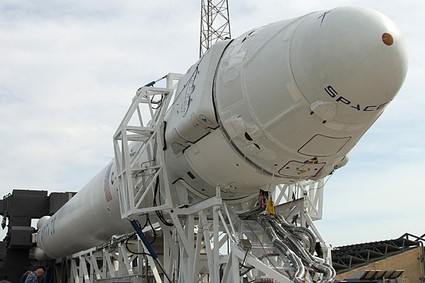
On May 25, 2012, Space Exploration Technologies Corporation, more commonly known as Space X, sent the space shuttle, Dragon, to the International Space Station (ISS), making Dragon the first private and commercial spacecraft to be launched successfully. Under NASA’s Commercial Resupply Services program, Dragon will begin regularly delivering cargo to the ISS in August 2012. Although Dragon first flew unmanned, once the regular delivery begins, it will carry up to seven astronauts, in addition to cargo. When two large screens showing the progress of Space X Dragon displayed that Dragon had docked safely in the space station, Charles F. Bolden JR, the former shuttle commander and the current Administrator of NASA, noted, “Today is, and I’m not overstating this, a day that will go down in history. The debate about our direction is over and we’re moving strongly into implementing some very exciting plans. If you’ re still wondering if this new era is real, I think the Space X success this week should begin to dispel those notions.”
However, competitors of Space X are not very far behind. Blue Origin, founded by Jeff Bezos of Amazon.com, has been testing its Space Vehicle capsule, which is designed to carry approximately seven astronauts to the ISS. Mark Sirangelo, a vice president of another space shuttle company Sierra Nevada announced that the company would begin test flights of the Dream Chaser, a smaller version of the space shuttle, next week. A fourth company called Orbital Sciences Corporation is scheduling its first launch later in the year.
When asked about further influences of private space shuttles in a CNN interview, Douglas King, the president of the Museum of Flight in Seattle, Wash, said, “Things that used to only be accessible to a few carefully selected highly qualified right-stuff government employees are finally coming within reach of researchers, businesspeople and explorers. Space X deserves a lot of credit. That’s an incredible achievement out there today – done only by governments before – and a lot of other people are going to follow.”
Despite the successes of several companies, the congressional debate over the Commercial Crew Program, which enables NASA and private companies to cooperate and develop a new space shuttle and astronauts, is yet to be over. Although President Barack Obama asked for $830 million of support for the program per year, neither the Republican-controlled House nor the Democratic-controlled Senate was willing to endorse more than $525 million for the program. In addition, the House is asking NASA to pick one company among the four – Space X, Boeing, Sierra Nevada, and Blue Origin – that will have an exclusive contract with NASA to produces a new space shuttle because, according to USAToday, the House thinks “the competition presents a significant risk of costly, lengthy delays.”
Other opposing opinions from the congress include that NASA should focus limited funding and resources on their own missions, specifically a Mars mission that is now about two decades from reality. Others doubt whether it is reasonable to spend more than $17 billion per year on space travel when the government’s debt is increasing day by day.


I think this is a really nice article.
However, I see a flaw in that your article headline suggests that this article will focus on Space X but your article begins talking about other companies in the middle of the article. If you could, it would be a better representation of your article if your headline were something like “Space X Dragon and Company: The Pioneers of Private Space Shuttles”
But all in all, I think this article is very enjoyable and well-researched.